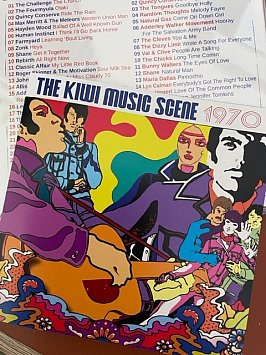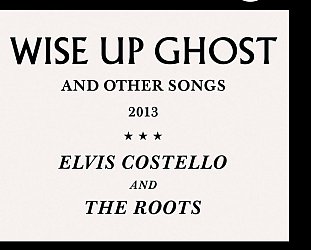Graham Reid | | 1 min read
The Eyes of Love, by Bunny Walters

The diligent Grant Gillanders continues his chronological excavation of New Zealand music and arrives at 1970 – by which time pop and rock had long parted company.
This 53 song double album includes a few familiar songs (Fourmyula's stoner suggestions on Otaki and the lovely Turn Your Back On the Wind, Quincy Conserve's terrific Ride The Rain) but mostly brings to light material by lesser-known artists like the Adderley Walker Movement (Tommy and Mike respectively), Zonk, Lynne Pike, Random Thoughts, Val and Clive, Tap Heperi and cabaret singer Lyndon Ferris among them.
Chances are you've never heard of them.
Me neither.
Which means this collection is full of surprises, even from those like Max Merritt (with Western Union Man) who by this time was fully embracing horn-driven soul, and Johnny Devlin revisiting Lawdy Miss Claudy 70, also with horns.
 Chicago and Blood Sweat and Tears were very influential and popular in the late Sixties/early Seventies and their sound appealed to the jazz-rock crossover audience and musicians (hence Adderley and Walker covering Does Anybody Really Know What Time It Is, with a weird sound effects section) and MOR artists (Mr Lee Grant, Craig Scott, Nash Chase, the Rumour etc) got orchestration.
Chicago and Blood Sweat and Tears were very influential and popular in the late Sixties/early Seventies and their sound appealed to the jazz-rock crossover audience and musicians (hence Adderley and Walker covering Does Anybody Really Know What Time It Is, with a weird sound effects section) and MOR artists (Mr Lee Grant, Craig Scott, Nash Chase, the Rumour etc) got orchestration.
Elton John was also popular so here are his Ballad of a Well Known Gun and Sixty Years On (both by Hayden Wood) and Take Me to the Pilot (the Tongues), and they are rather good.
The collection once again reminds what fine producers and professional, versatile studio musicians we had at the time.
There are some unusual songs here (Quincy Conserve's lyrically odd Everybody Has Their Way) and the collection mostly errs towards the pop rather than rock end of the spectrum (check out Adderley and Walker on Hooray for the Salvation Army Band though).
The opener The Crunch by the Challenge is an odd one: it boasts a great rock riff but the lyrics are lame and apparently it was designed to create a dance craze.
Among the many things the Beatles did was kill off the American music industry's proclivity for manufacturing dances to sell to gullible teens.
To try getting one going in 1970 seems very perverse.
But the fact so many of these songs are unfamiliar – other than the covers – makes for an interesting journey through our back pages and some enjoyable discoveries along the way.







post a comment